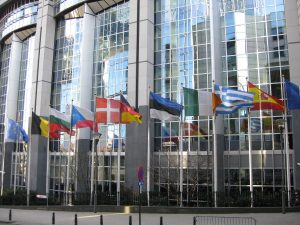The European Union has threatened to revoke its trade preferences to the Philippines in response to “the seriousness of the human rights violations” committed by the administration of President Rodrigo Duterte.
Since taking office in 2016, Duterte has tightened the screws on critics while prosecuting a ruthless “war on drugs” that by some estimates has led to the deaths of over 12,000 people.
The Philippines currently enjoys privileged access to the European market under the EU’s Generalized Scheme of Preferences Plus (GSP+) scheme, which grants duty-free entry to more than 6,200 products.
In a September 17 resolution, the European Parliament stated that “in the absence of any substantial improvement and willingness to cooperate on the part of the Philippine authorities,” the resolution called on the European Commission “to immediately initiate the procedure which could lead to the temporary withdrawal of GSP+ preferences.”
The EU grants the GSP+ incentive only to countries that have ratified “27 core international conventions on human and labor rights, environmental protection, and good governance.” But it is conditional on the effective implementation of these conventions. Among the goods exempt from duties under GSP+ are fruits, animal and vegetable fats, textiles, footwear, vehicle parts, and metals. Formal negotiations for a Philippine–EU Free Trade Agreement began in 2015, but have since ground to a halt over human rights questions.
The suspension of trade preferences would undoubtedly have significant effects on the Philippine economy. The year after it gained GSP+ status in 2014, Philippine exports to the European Union grew by 27 percent. The EU is now the Philippines’ fourth largest trading partner, accounting for almost 9 percent of the country’s total trade in 2018. Following the EU’s announcement, Vice President Leni Robredo, a staunch critic of Duterte’s administration, has estimated that the revocation of GSP+ access could lead to the loss of up to 200,000 jobs.
While Philippine Trade Secretary Ramon Lopez said the government would cooperate with the EU on the GSP+ issue, Presidential spokesman Harry Roque immediately decried Brussels’ move as a violation of Philippine sovereignty, daring Brussels to following through on its threat to suspend trade perks. “Stop the discussions. They should do what they want to do during this time. If they want to implement it, go ahead,” he said, according to a translation from Rappler.
This is consistent with the belligerent approach that Duterte has taken in response to Western criticisms of his drug war. “Why are you trying to impose on us?” he said in a 2017 speech, following European criticisms of the blood-soaked campaign. “Why won’t you mind your own business.”
In February this year, Duterte announced he was suspending the Visiting Forces Agreement with the United States, which lays out vital protocols for the deployment of American personnel to the Philippines. The reason? Washington’s denial of a visa to his ally Senator Ronald dela Rosa, who played an important role in the anti-drug campaign as chief of the Philippine National Police. (Duterte later backtracked on the decision.)
The European Parliament’s resolution is just the latest sign of its increasing willingness to leverage its economic power to human rights ends. In February, the EU partially suspended the trade preferences that Cambodia enjoyed under the bloc’s Everything But Arms (EBA) scheme, following a harsh political crackdown by Prime Minister Hun Sen’s government. The suspension, which came into effect on August 12, covers one-fifth of Cambodia’s annual exports to the EU, or around or around $1 billion worth of merchandise. Brussels has also mooted the withdrawal of EBA privileges from Myanmar, in retaliation for the military’s merciless assaults against the Muslim Rohingya of Rakhine State.
The efficacy of the EU’s trade-based human rights policy in Southeast Asia remains to be seen. Trade sanctions are only as effective as the economic pain they cause; and unlike targeted sanctions, which pinpoint individual leaders responsible for human rights abuses, the brunt of the economic impact is most likely to fall on ordinary people cast out of work by the closure of factories and other enterprises.
Moreover, while opposition figures in both Cambodia and the Philippines have strongly supported the EU’s use of trade sanctions, many governments still chafe at any hint of what they self-interestedly perceive as Western “interference” in their affairs. There is also a perception that the EU is applying its human rights conditionalities selectively. In the case of Cambodia and the Philippines, this has incentivized governments to pursue closer relations with China, which has recently made strategic inroads in both nations.
This dynamic underscores the tensions inherent in the EU’s human rights policy toward Southeast Asia, which remains torn between the pursuit of values and wider strategic interests, especially as they relate to the challenges posed by a resurgent China. With Beijing offering the region an alternative model of non-judgmental, “no-strings” engagement, don’t expect this tension to be resolved any time soon.

































